


As the Russia-Ukraine conflict enters its fourth year, its ripple effects continue to shape global geopolitics, economies, and everyday lives. Let's examine the evolving dynamics of the conflict, the diplomatic efforts for peace, and the shifting sentiments on the ground and look at the current situation as well as the shifting US stance and EU commitments that may affect the conflict's outcome.
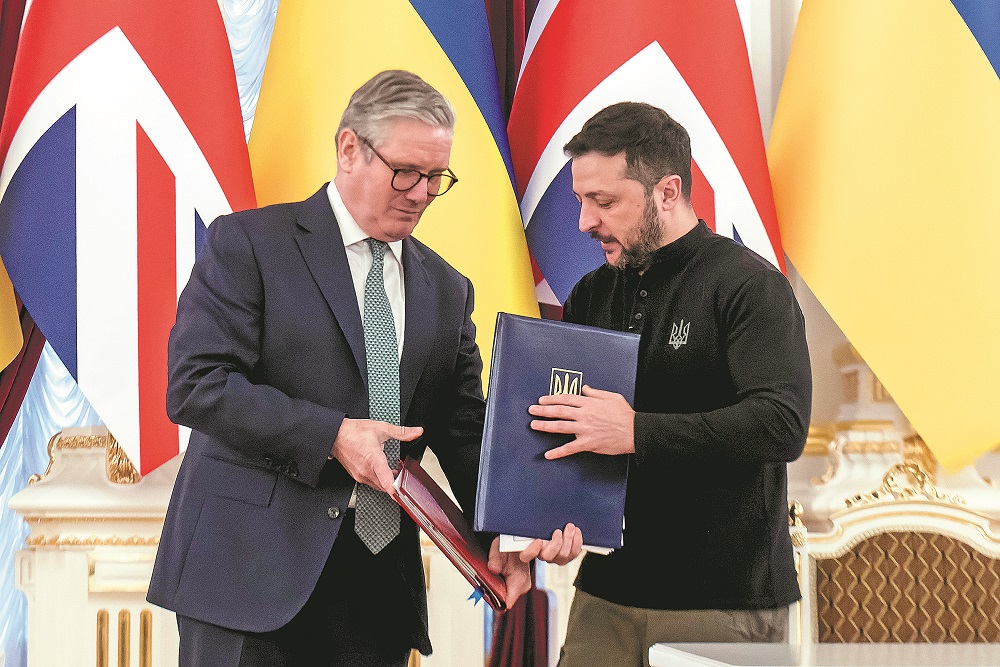
The United Kingdom should spend more on public services instead of arms for Ukraine, which only prolongs the conflict, experts say, criticizing the government's proposals for a "100-year alliance "and putting British troops "on the ground" as dangerous political gimmicks.
Over the past three years, the UK has provided 12.8 billion pounds ($16.2 billion) to Ukraine, with military assistance accounting for 7.8 billion pounds, including tanks, air defense systems, artillery, and long-range precision strike missiles, according to a briefing published by the UK Parliament on Feb 14.
That amount ranked second among European countries, with Germany the most important donor, providing 17 billion euros ($17.8 billion) in total, according to the Ukraine Support Tracker by the Kiel Institute for the World Economy.
During UK Prime Minister Keir Starmer's visit to Kyiv last month, the two countries signed a 100-year partnership agreement, with the UK government committing $3.8 billion in military aid per year for Ukraine. More recently, Starmer, for the first time, explicitly said he was considering deploying British peacekeepers to Ukraine.
"The UK is ready to play a leading role in accelerating work on security guarantees for Ukraine.… It also means being ready and willing to contribute to security guarantees to Ukraine by putting our own troops on the ground if necessary," he wrote in an opinion piece published by The Daily Telegraph on Feb 16.
Keith Bennett, a senior analyst of international relations in London, criticized those stances of the UK government as attacking British people's living standards — such as limiting child care support and the winter fuel allowance — while pledging an annual minimum of $3.8 billion in aid for Ukraine.
"The government is constantly claiming to have discovered a 'black hole' in the nation's finances… Yet, on the other hand, it declares that it will continue to give the notoriously corrupt Ukrainian government 'whatever it takes for as long as it takes'," Bennett told China Daily, adding that the supposed "100-year partnership" is just a gimmick.
"How can such an agreement be reached without serious preparations? Britain has no such 100-year agreement with any other country," he said. The most Starmer might be able to guarantee "is 5 years, not 100", he added.
Bennett also said Starmer's statement on deploying British troops in Ukraine is another "dangerous" and "bellicose gimmick" because Britain is a member of NATO and will be seen by Russia not as a neutral observer but an actual, hostile participant in the conflict.
"In a word, if there are to be British troops in Ukraine, there isn't going to be a cease-fire. So, it is simply an attempt to prevent a ceasefire — to continue fighting Russia to the last Ukrainian."
Lindsey German, convener of Stop the War Coalition, expressed a similar view in her opinion piece on Feb 17, saying Starmer's "vainglorious behavior over Ukraine — promising a 100-year alliance with the country and repeatedly claiming that Britain will support fighting to the end and total victory — has been little short of delusional".
'At our expense'
"Big increases in arms spending will come from our pockets and our public services. Preparing for real security in Britain and elsewhere means providing security of work, health, housing, not more weaponry and militarism at our expense which will only create greater insecurity and feed far-right forces," she wrote.
Writing for the Morning Star newspaper on Feb 13, Andrew Murray, a former political adviser to the Labour Party from 2018 to 2020, said the current government's stance on the Russia-Ukraine conflict is "reckless" and "doomed to fail" as the United States has pivoted its stance for a potential peace deal.
"Raising entirely unrealistic slogans is no help to Ukraine and damaging to the interests of British workers," he said. "Rather, the labor movement should unite in demanding that the government assist in getting negotiations going or at least get out of the way."
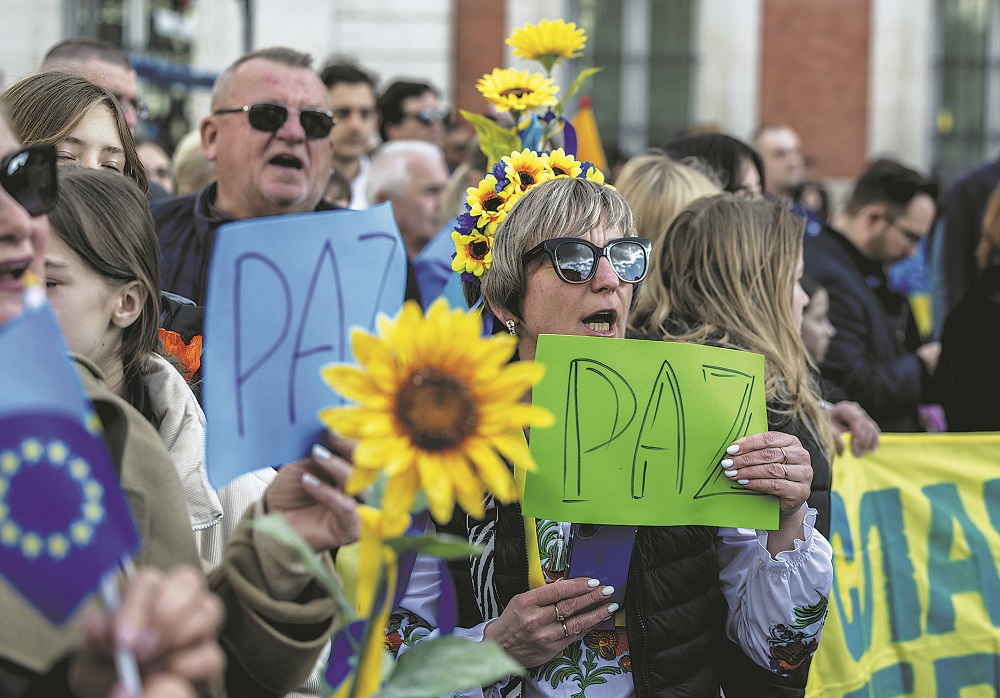
European leaders vowed continued support for Ukraine despite their outrage against the administration of US President Donald Trump for discarding its allies in the ongoing peace talks on the Russia-Ukraine conflict.
European Council President Antonio Costa announced on Thursday that he will go to Kyiv on Monday with European Commission President Ursula von der Leyen to reaffirm the EU's support. Monday marks the third anniversary of the Russia-Ukraine conflict.
European leaders were shocked after US Secretary of Defense Pete Hegseth told the Ukraine Defense Contact Group in Brussels on Feb 12 that US troops won't be deployed in Ukraine for peacekeeping while soldiers from NATO's European member states there won't be covered by Article 5, which stipulates that an attack on any member is an attack on the whole alliance.
US envoy to Ukraine Keith Kellogg told the Munich Security Conference on Feb 15 that Europeans won't have a seat at the negotiation table. On Feb 14, in Munich, US Vice-President JD Vance delivered a blistering attack on Europe — from democracy and freedom of speech to migration.
French President Emmanuel Macron hastily assembled a meeting in Paris on Feb 17 with several European leaders to discuss the crisis. He held another larger meeting of 19 nations on Feb 19, with many attending via video link, to discuss how to respond to Trump.
Macron said it was unacceptable for the US and Russia to negotiate over European leaders' heads. "The security concerns of the Europeans will have to be taken into account," he said.
Macron and British Prime Minister Keir Starmer will travel separately to Washington this week. They are expected to try to convince Trump not to rush to a cease-fire deal with Russia at any cost, keep Europe involved and discuss military guarantees to Ukraine, Reuters reported.
EU ambassadors met twice last week to talk about sending arms to Ukraine and bolstering defense. But Costa has not yet called for a summit of all member states' leaders to address the crisis.
EU leaders have fought back against Trump who called Ukraine President Volodymyr Zelensky a "dictator" last week. German Chancellor Olaf Scholz, who is likely to step down after the Sunday election in his country, said that "it's simply wrong and dangerous to deny President Zelensky democratic legitimacy".
Von der Leyen also rebuffed US criticism. She said in Munich that Europe's financial and military support to Ukraine has amounted to 134 billion euros ($141 billion), more than anyone else.
The 27 EU member states currently spend around 2 percent of their GDP on defense. Their total defense spending has jumped from 200 billion euros before the conflict to over 320 billion euros in 2024.
"But we will need to increase that number considerably once again. Because from just below 2 percent to above 3 percent will mean hundreds of billions of more investment every year," she said, clearly in a response to Trump's call for NATO members to spend 5 percent of GDP on defense, which no NATO member has reached so far.
The European Commission estimated that the EU may need to spend an extra 500 billion euros over the next decade to fill the critical gaps in European defense.
While most European leaders agreed to boost defense spending, there is no consensus on where the money will come from. For instance, issuing joint debt is a controversial issue among the member states.
Von der Leyen and Costa both expressed that the EU has several potential financing options, including national spending, an expanded role for the EU's European Investment Bank and private capital.
The current European Commission, which took office on Dec 1, has promised to present its White Paper on the Future of European Defense in its first 100 days in office.
"Europe's disunity and dependence on the US means that European countries will broadly accept whatever emerges from talks between the US and Russia," Jeremy Shapiro, director of research at the European Council on Foreign Relations, said after senior US and Russian officials met in Riyadh.
Shapiro believes that Europeans need to form their own peace plan, deploy carrots and sticks, and above all, show that they have sufficient unity to implement these.
He sighed that instead, Europeans emerged from the Feb 17 summit in Paris publicly fighting over deploying a peacekeeping force to Ukraine.
"The message to the US(and Russia) was clear: we do not need to invite Europeans to the table. Until they can put their own house in order, Europeans will have no choice but to watch from the sidelines," he wrote on the council's website.
He Zhigao, a researcher at the Institute of European Studies at the Chinese Academy of Social Sciences, said the EU is both disappointed and outraged by the Trump-led peace talks with Russia. "There is no doubt that the EU's role in the conflict will be heavily influenced by the US-Russia peace talks," he said, citing the fractures among EU member states and between the EU and the US.
"EU is incapable of handling the Russian threat by itself and incapable of supplanting the US military aid to Ukraine. But it can play a role in helping Ukraine join the EU and providing financial assistance," He said.
Nigel Gould-Davies, a senior fellow at the London-based International Institute for Strategic Studies, described the current situation as an "unprecedented trans-Atlantic crisis".
"By negotiating with Russia over European heads and intervening in European politics, the United States is not only decoupling from but deciding for and disrupting Europe," he said.
In a post on Thursday right after Polish Prime Minister Donald Tusk's call for financing Ukraine with frozen Russian assets, Gould-Davies said that "with the US signaling abandonment of Ukraine and scaling back of commitment to Europe, the case for seizing $300 billion of frozen Russian assets and transferring them to Ukraine is now unassailable".
In the wake of a challenging week for Europe amid the US diplomatic blitz on Ukraine, longstanding allies feel sidelined.
As the Ukraine conflict nears its fourth year, Europe seeks a role in negotiations, yet the US appears indifferent. Tensions peaked at the Munich Security Conference, with US officials even casting doubt on Europe's security commitments.
A pivotal moment arose as top US and Russian diplomats met in Saudi Arabia, excluding Kyiv and European allies.
Despite White House assurances, EU leaders emphasize unity. Europe faces a crucial juncture, potentially steering toward greater autonomy and complicating US-Europe ties.
As a peace promoter, China supports all efforts for peace, urging inclusive dialogue that involves all parties and stakeholders.
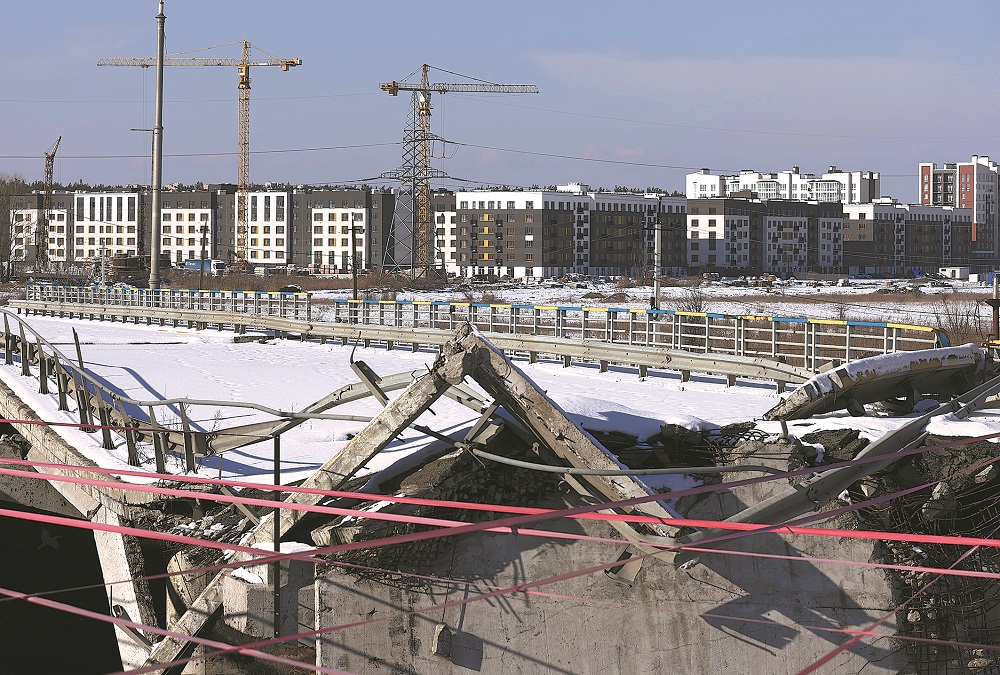
KYIV — Relations between Ukrainian President Volodymyr Zelensky and US President Donald Trump deteriorated rapidly on Wednesday as Zelensky said Trump was living in a "disinformation space", and Trump called Zelensky "a dictator without elections" in comments that were sure to complicate efforts to end the conflict.
Zelensky also said he would like Trump's team "to be more truthful "as he offered his first response to a series of striking claims that Trump made a day earlier, including suggesting that Kyiv was to blame for the Russia-Ukraine conflict, which enters its fourth year next week.
The comments were a staggering back-and-forth between leaders of two countries that have been staunch allies in recent years under Trump's predecessor, Joe Biden.
The Trump administration has started charting a new course, reaching out to Russia and pushing for a peace deal. Senior officials from both countries held talks on Tuesday to discuss improving ties, negotiating an end to the conflict and potentially preparing a meeting between Trump and Russian President Vladimir Putin after years of frosty relations.
Trump lashed out at Zelensky in a social media post that apparently referred to the fact that Ukraine has delayed elections because of the conflict and the subsequent imposition of martial law by the Ukrainian Constitution.
Trump also called Zelensky "a modestly successful comedian" who "talked the United States of America into spending $350 Billion Dollars, to go into a War that couldn't be won, that never had to start, but a War that he, without the US and 'TRUMP', will never be able to settle".
The president went on to advise Zelensky to "move fast or he is not going to have a Country left".
The outburst followed Zelensky's comments on Tuesday that Trump "lives in this disinformation space "fostered by Moscow when he asserted that Ukraine "should never have started" the conflict.
Separately, Zelensky has suggested giving US companies the right to extract valuable minerals in Ukraine in return for US security guarantees.
He rejected a US proposal last week that would have seen Washington receiving 50 percent of Ukraine's critical minerals, including lithium, a key component in electric car batteries.
Zelensky told reporters on Wednesday that the deal was too focused on US interests, saying, "I can't sell our country."
Speaking to reporters aboard Air Force One on Wednesday, Trump said Ukraine had "more or less "agreed to the proposal and complained that US Treasury Secretary Scott Bessent was treated "rather rudely" while visiting Kyiv.
The president said he would seek to resurrect the minerals deal.
Possible meeting
Meanwhile, Putin said he would like to meet with Trump.
Russia started its special military operation on Feb 24, 2022, accusing the US and its allies of ignoring Russia's demand to prevent Ukraine from joining NATO and to offer Moscow security guarantees.
"I would like to have a meeting, but it needs to be prepared so that it brings results," Putin said on Wednesday in televised remarks.
He added that he would be "pleased" to meet Trump but noted that Trump has acknowledged that a Ukrainian settlement could take longer than he initially hoped.
The Russian leader hailed Tuesday's talks between senior Russian and US officials in Riyadh, Saudi Arabia, as "very positive".
"The goal and subject" of the talks "was the restoration of Russia-US relations", Putin said.
"Without increasing the level of trust between Russia and the United States, it is impossible to resolve many issues, including the Ukrainian crisis. The goal of this meeting was precisely to increase trust between Russia and the United States."
Agencies - Xinhua
MOSCOW -- Potential plans to deploy North Atlantic Treaty Organization (NATO) forces to Ukraine are concerning, Kremlin spokesman Dmitry Peskov said on Thursday.
The statement comes following reports that British Prime Minister Keir Starmer is set to propose to US President Donald Trump a Ukraine peacekeeping plan, which is expected to send up to 30,000 European troops to Ukrainian cities.
Peskov said Moscow was closely monitoring all the statements made by European officials.
"This is a matter of concern to us ... as we are discussing the potential deployment of military contingents from NATO countries to Ukraine," Peskov said.
He also said that all objectives in Ukraine should preferably be achieved through peaceful means, adding that the Trump administration believes it is necessary to achieve peace as soon as possible through negotiations, and that Moscow strongly agrees with this approach.
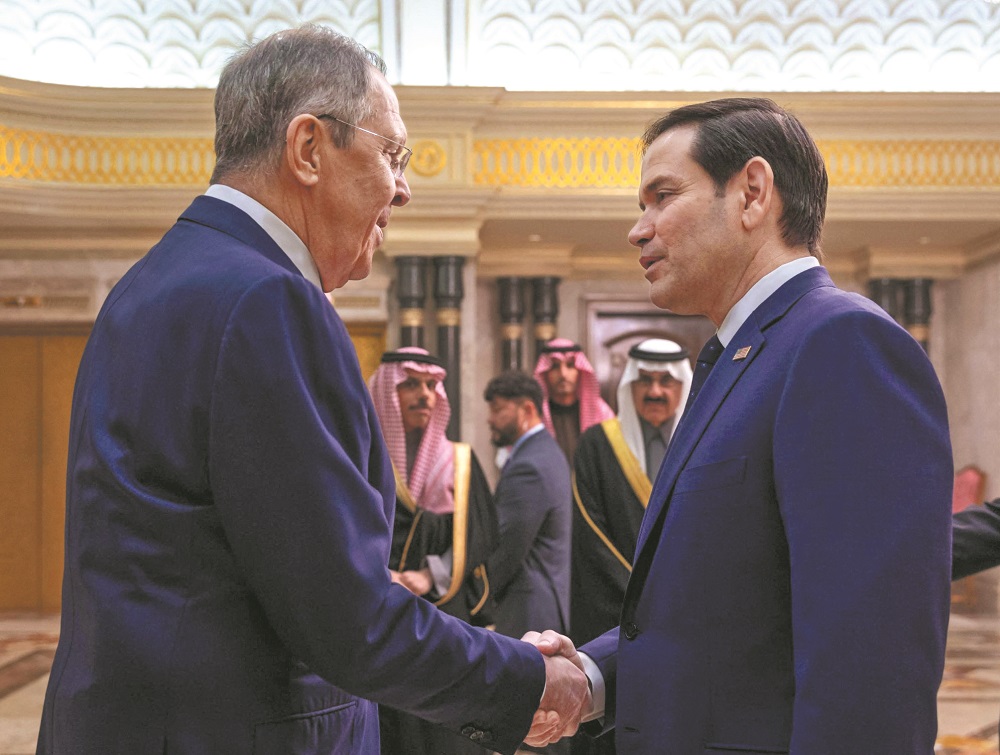
The exclusion of Europe and Ukraine from US-Russia talks on the Ukraine crisis has exposed deepening rifts in trans-Atlantic relations, experts say.
They also suggest that a thaw in relations between Washington and Moscow could reshape the course of the Russia-Ukraine conflict, with Europe and Ukraine fearing their interests might be ignored in peace negotiations.
During high-level talks in Riyadh, Saudi Arabia, on Tuesday, the United States and Russia agreed to work on a path toward ending the conflict and improving bilateral ties.
Although US Secretary of State Marco Rubio later assured there would be engagement and consultation with Ukraine and European nations on the Ukraine issue, European leaders expressed concern over being sidelined from the closed-door talks, fearing their interests might be ignored in US President Donald Trump's pursuit of his Ukraine deal.
European nations have been left at "the kids' table" in discussions over the future of Ukraine, said Armin Papperger, CEO of Rheinmetall, Germany's largest defense contractor, on the sidelines of the Munich Security Conference, as reported by the Financial Times on Tuesday.
Zhang Hong, a researcher at the Institute of Russian, Eastern European and Central Asian Studies of the Chinese Academy of Social Sciences, told China Daily that if the US and Russia have set the direction and framework for resolving the Ukraine crisis, involving Ukraine and the European Union would just be a formality.
"When the US mentions future European participation, it doesn't imply genuine involvement. Once the US and Russia reach a consensus, they can persuade Europe and Ukraine to accept the outcome, addressing some of their security concerns," Zhang said.
"This is why some say Europe has been relegated to the 'kids' table', losing its major say and gaining neither substantive benefits nor its respectability in the peace talks."
Ukrainian President Volodymyr Zelensky criticized his nation's exclusion from the Riyadh talks, saying that Ukraine would not accept any outcome from discussions in which Kyiv was not involved. In response, he postponed his trip to Saudi Arabia.
Trump rebuked Kyiv's complaints, stating: "Today I heard, 'Oh, well, we weren't invited.' Well, you've been there for three years. You should have never started it. You could have made a deal."
Zhao Yongsheng, a professor at the Institute of Regional and International Studies at the University of International Business and Economics in Beijing, highlighted the contrast between the US and Europe in their views on the crisis.
"For Europe, the conflict is an existential matter, while for Trump, it's a matter of cost-benefit," he said.
"The Trump administration, viewing the conflict through an interest-based lens, believes it's not worth the investment and seeks to strategically withdraw from Europe to focus on other strategic priorities, including easing tensions with Russia.
"Conversely, Europe sees the Ukraine issue through a values-based perspective, with deep-seated distrust and hostility toward Russia, leading them to discuss supporting Ukraine independently."
French President Emmanuel Macron was scheduled to host a meeting on Ukraine on Wednesday, aiming to coordinate a European response to what he describes as an "existential threat" from Russia, following the US policy shift.
Zhao said, "These US-Europe differences may reduce the conflict's intensity, but future disagreements still require consultation to resolve."
The Riyadh talks marked the first face-to-face meeting between senior US and Russian officials since the Russia-Ukraine conflict broke out three years ago. The discussions resulted in several agreements aimed at resolving bilateral issues and thawing diplomatic ties.
Yuri Ushakov, the Kremlin's foreign affairs adviser, described the talks as "positive".
According to a US State Department statement, both countries agreed to set up a consultation mechanism to manage bilateral relations and normalize diplomatic missions. They will also appoint high-level teams to work toward a lasting resolution of the conflict while exploring future cooperation on geopolitical and economic interests tied to a resolution of the conflict.
Dmitry Suslov, deputy director of the Center for Comprehensive European and International Studies at the National Research University-Higher School of Economics in Moscow, said the discussions revolved around initiating full-scale negotiations to resolve the Ukraine crisis, with both sides resuming normal diplomatic interactions across a broad agenda.
Agencies contributed to this story.
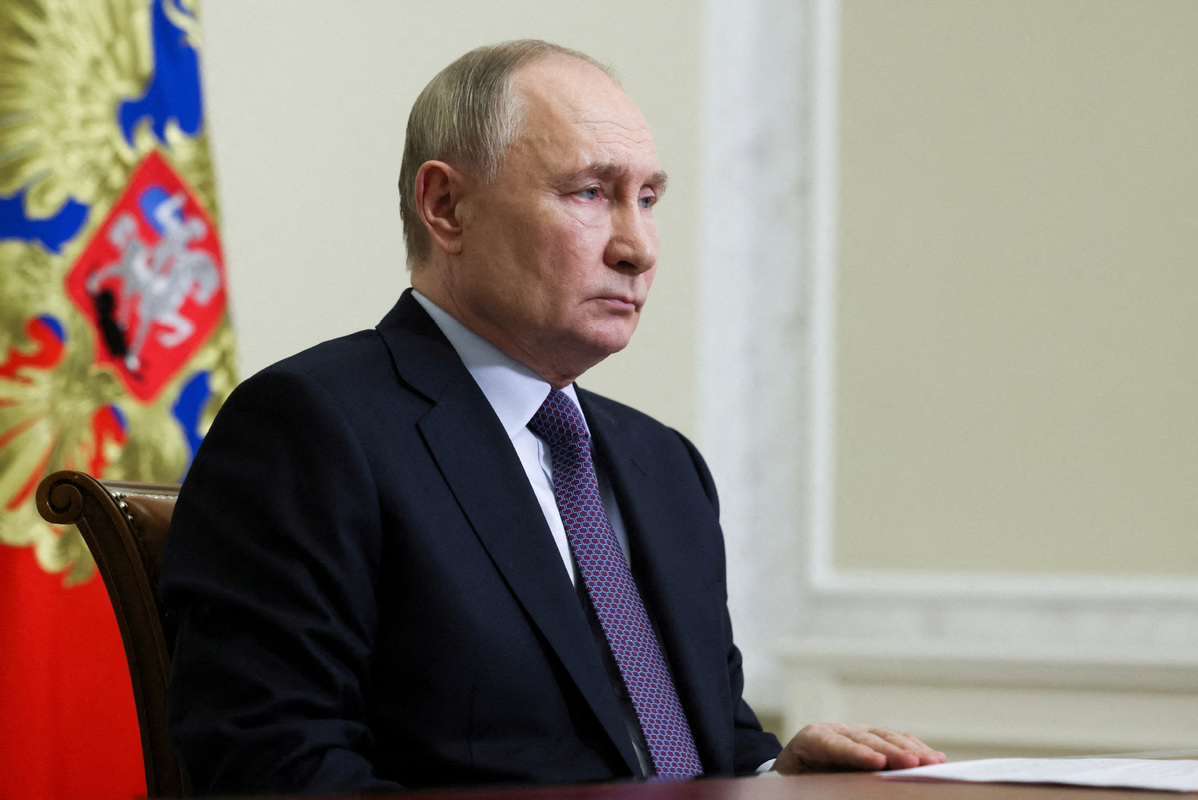
MOSCOW - Russian President Vladimir Putin said he was informed about the recent Russia-US talks in Riyadh, describing the results as positive, local media reported on Wednesday.
"I've been briefed on the talks. I appreciate them. There is a result," Putin said answering media questions during a visit to an UAV production plant in St. Petersburg.
Putin said he highly valued the outcome of the high-level meeting, and said the negotiations paved the way towards resuming cooperation in various areas of mutual interest.
The talks were primarily focused on restoring relations between Moscow and Washington, Putin noted, adding that strengthening trust between both countries was crucial for resolving pressing issues, including the Ukraine conflict.
Russia and the United States are working together on key issues related to economic, space, and energy cooperation, he stated.
Putin also said that he would like to meet with US President Donald Trump, though some preparation was necessary beforehand.
Talking about the possible negotiation on Ukraine, Putin said Trump had told him in their phone conversation that the United States assumed that both Russia and Ukraine would take part in it.
Russian and US delegations held talks on Tuesday in Riyadh, Saudi Arabia, in the first face-to-face interactions between senior US and Russian officials since the outbreak of the Russia-Ukraine conflict in February 2022.
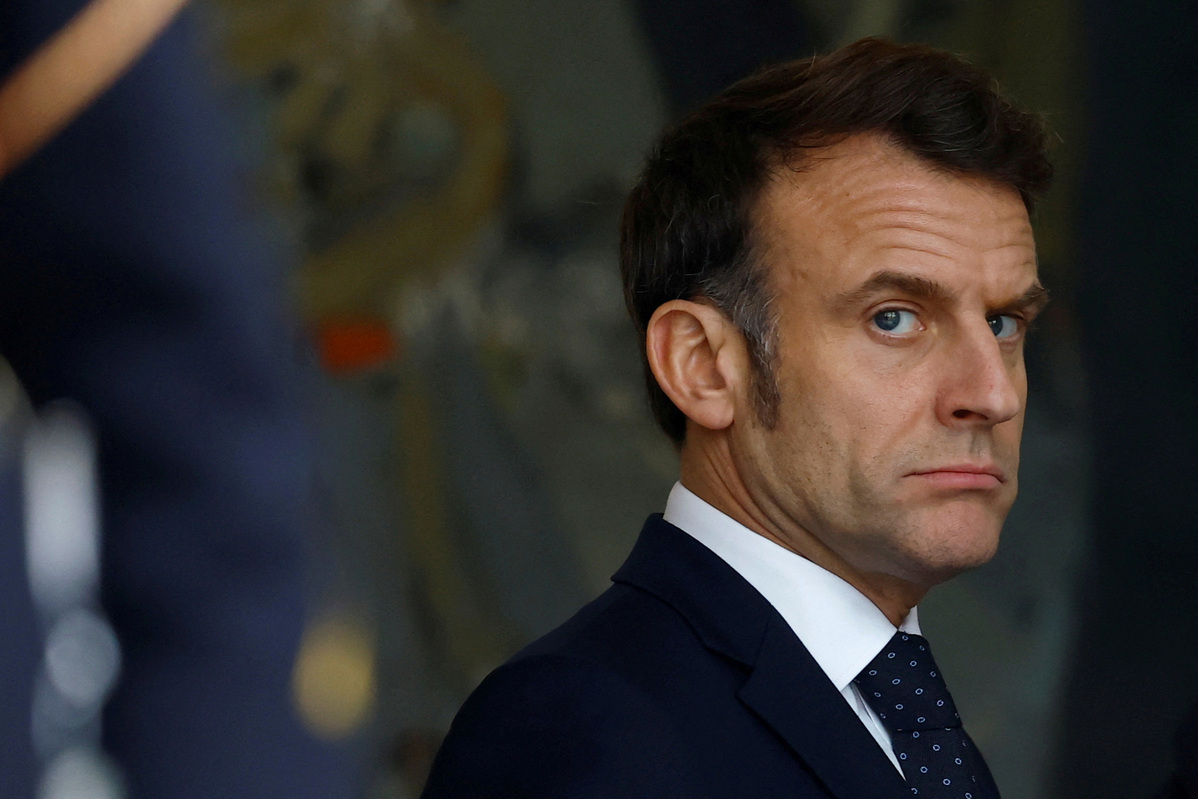
Monday's emergency meeting in Paris exposed underlying divisions among European leaders regarding Ukraine and transatlantic relations, an expert has said.
The small, informal summit was called by France's President Emmanuel Macron, to discuss Ukraine and European security amid a growing rift between Europe and the United States, after the Donald Trump administration arranged bilateral talks with Russia, excluding Europe and Ukraine, aimed at exploring ways to end the Russia-Ukraine conflict.
Key participants at Monday's summit included the leaders of Denmark, France, Germany, Italy, Poland, Spain, the Netherlands and the United Kingdom, as well as NATO Secretary-General Mark Rutte, European Council President Antonio Costa and European Commission President Ursula von der Leyen.
"Even with just a small number of European leaders gathered there, important differences emerged among them," said Radhika Desai, a professor in the department of political studies at the University of Manitoba in Canada and a visiting fellow at the London School of Economics and Political Science. "Clearly, the idea behind keeping the numbers small was to increase the possibility of agreement, but now you have a variety of rather strange positions.
"These horizontal differences among European countries are always there, I would say, but they have now come out in the open."
The European leaders in attendance called for more spending on defense but remained divided on the possible deployment of peacekeeping troops to Ukraine, Reuters reported.
UK Prime Minister Keir Starmer said he was prepared to put British troops into Ukraine to enforce a peace deal, if necessary, but Germany and Poland opposed the idea.
Desai pointed out that there were even nuances in nations' stances on issues on which they agreed, such as on increased defense spending.
"Obviously, some countries, particularly the British, have been more in favor of the US interventions. But I think, while France is generally in favor of increasing military spending, this means that Europeans should start paying more for their security and seek a greater say within NATO. It does not necessarily mean that they are complying with what the US wants," she said.
Starmer said any Ukraine peace deal would require a "US backstop" to deter Russia.
And EU member states that were not invited to Monday's gathering, including Hungary, have shown "reluctance" about the approaches taken by major European powers, Desai said.
Hungary's Foreign Minister Peter Szijjarto slammed the Paris summit as a gathering of "frustrated European politicians" looking to "pour oil on the fire" and "prevent a peace agreement with Ukraine", according to the Hungarian state news agency MTI.
The Politico news website described the meeting as a "radical step", because the small group of the continent's leading powers "dumped the traditional craving for 27-nation consensus at Brussels summits and tried to sort out the mess themselves".
"Besides the horizontal differences, there are also vertical differences (within nations), between the rulers and the ruled that will erupt out into the open," said Desai. "People said the Joe Biden administration has united Europe and NATO, and now Trump is disuniting them. No, Biden seemed to unite them, but only at the cost of imposing such pressures as to divide European societies amongst one another and divide them internally."
Wake-up call
Trump's shift in stance on Ukraine was seen by Europe as a wake-up call to take responsibility for its own defense, as the US president seeks to shift the burden onto his European allies.
In fact, there has long been an attempt to establish a common European security policy, Desai noted. However, she said the key realization for the bloc is that Europeans do not need to adopt a "belligerent foreign policy" to protect the continent.
"Shouldering its own security does not mean that all must arm themselves to the teeth," she said. "That's getting security completely wrong. Security does not consist of making enemies of all your neighbors. On the contrary, it consists of making friends with all your neighbors.
"You may not love all your neighbors, you may have your differences with them, but you essentially ensure that you can live side-by-side, if possible to mutual benefit.
"A good, neighborly relationship, both with the Atlantic powers on the one hand but also with Russia, Africa, China, and all its neighbors, can allow it to prosper. There is absolutely no reason why it should not."
zhengwanyin@mail.chinadailyuk.com
MOSCOW - Russian President Vladimir Putin remains ready to hold negotiations with Ukrainian President Volodymyr Zelensky if necessary, Kremlin Spokesman Dmitry Peskov said Tuesday.
Russia has been committed to finding a peaceful resolution to the Ukrainian conflict from the very beginning, Peskov was quoted by TASS news agency as saying.
He stressed that a long-term settlement of the Ukrainian conflict cannot be achieved without addressing security concerns.
"As for the security architecture in Europe, of course, a comprehensive settlement, a long-term and viable settlement is impossible without a comprehensive consideration of security issues on the continent," Peskov said.
UNITED NATIONS - The United Nations welcomes all efforts to resolve the Ukraine-Russia conflict and sees the phone call between the US and Russian leaders as a "positive thing", a UN spokesman said Wednesday.
"What we would appreciate is any efforts to resolve the war in Ukraine that would involve the Russian and Ukrainian sides. And so obviously, if both of them are willing to be involved in a process, that would be a welcome development," said Farhan Haq, deputy spokesman for UN Secretary-General Antonio Guterres, speaking of the phone conversation.
"Given the importance of the United States and the Russian Federation, the UN welcomes any efforts to resolve issues through regular contact," the spokesman said at a daily press briefing, calling the conversation between the two leaders "a positive thing".
The White House and the Kremlin announced separately on Wednesday that US President Donald Trump and Russian President Vladimir Putin held a phone conversation.
Trump said on social media he and Putin agreed that Washington and Moscow will immediately engage in direct negotiations aimed at ending the Ukraine-Russia conflict.
When asked whether the UN will be part of the negotiations, Haq said, "We would have to see what role we would have to play. Obviously, as we've said many times over the last three years, the United Nations is willing to play a good offices role if asked to by the parties."
